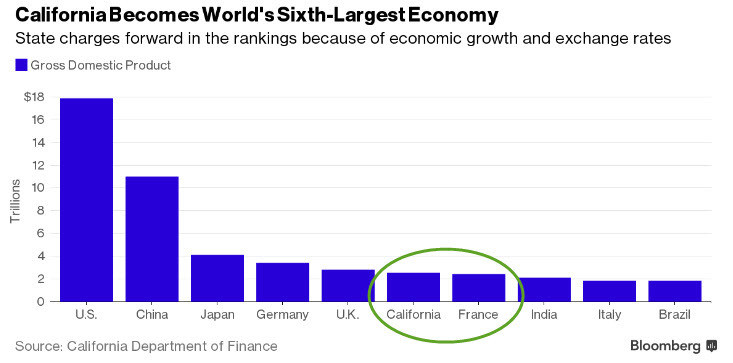2017-12-07California is the world’s sixth largest economy. Now is the perfect time for it to step up
Foro Económico Mundial |After the Second World War, US President Harry Truman called on the US to assume the mantle of world power. “Great responsibilities have been placed upon us by the swift movement of events”, Truman told the US Congress in March 1947.Seventy years later, the world looks very different. Cities, states, and regions - known as sub-national entities - are gaining autonomous global authority. They contribute to local citizens’ welfare and address global challenges such as climate change, migration or terrorism.
These entities have their own foreign policy, which is known as paradiplomacy. It is the new normal for mayors and governors. They sign international agreements, organize trade missions, and join international organizations, seeking global solutions to their local challenges. At the recent COP23 in Bonn, the Climate Summit of Local and Regional Leaders adopted the Bonn-Fiji Commitment “to deliver the Paris Agreement at all levels”.
Every US state and the majority of US cities with more than one million inhabitants conduct foreign affairs, with varying levels of efficacy and resources. Approximately 40 US states have a rough total of 250 representations abroad. Pennsylvania and Missouri operate the most overseas offices (15), followed by Florida (13) and Georgia (11).
But while power has grown at a sub-national level, leadership has not. National states have manifest leaders and the narratives of power are clearly demarcated by economic, military, technological or social strength. But sub-national mayors and governors have not shown the same drive. Leadership is diffuse and often absent. This makes activity fragmented, experimental, and often duplicated. Although there are more than 150 international networks and organizations with cities and states as members, about a third of them present overlapping agendas and questionable performance. This shows poor governance.

California is the world’s wealthiest sub-national entity - and its sixth largest economy, between the UK and France. Now is the perfect time for it to step in. To paraphrase Truman, California “must take immediate and resolute action”. It has made some headway in the international arena over the last decade. But it has been punching beneath its weight. California is the modern version of Kumbhakarna, the Hindu giant cursed to fight for six months of every year - and sleep for the remaining six.
California is bound to lead
California is a cradle foreign affairs experiment. Many signatories of the state’s original constitution, which was ratified in 1849 prior to California’s admission to the Union in 1850, had an international background. They were born in Mexico, France or Spain, such as Miguel Pedrorena or Pierre Sainsevain. But the constitution neglected international affairs. However, the practice was starting to germinate elsewhere. In 1857, the Australian state of Victoria became the first to set up a representation abroad, in London.
Throughout its history, California has attracted people from all over the world. But it took until Governor Pat Brown’s administration, from 1959 to 1967, for it to grasp the relevance of an international agenda. It opened offices in London and Tokyo, since discontinued, to strengthen international trade. Then it 1977, the state established an internal Office of International Trade. In 1999, it nominated a Secretary of Foreign Affairs to strengthen political and economic ties with international partners. Under Governors Arnold Schwarzenegger (2003-2011) and Jerry Brown (2011- present), it made some important achievements around trade and climate change.
2024-04-25
No hay atajos para comprender el clima, advierte un científico
Los puntos de inflexión de la Circulación Meridional de Retorno del Atlántico no son tan evidentes. Una nueva modelización matemática de una de las principales corrientes oceánicas de la Tierra destaca la complejidad del sistema.
2024-04-24
El proyecto Guardianas y guardianes de territorios moviliza a la juventud mexicana en la restauración medioambiental
Un proyecto, acompañado por la ONU, demuestra lo necesario que es el involucramiento de las comunidades en la preservación y protección de los ecosistemas y las áreas naturales que oxigenan el planeta y otorgan el alimento y otros recursos vitales.
2024-04-22
Cuidar a nuestra Madre Tierra
Día Internacional de la Madre Tierra - 22 de abril
2024-04-22
Vídeo destacado: Mueve la aguja sobre el metano
Los investigadores del MIT están desarrollando un sistema para reducir las emisiones de este potente gas de efecto invernadero en las granjas lecheras y otros sitios.
2024-04-18
Proponen colocar pulseras de silicona en las colmenas como detectores de contaminación ambiental
Un equipo de investigación internacional liderado por la Universidad de Almería ha determinado la utilidad de la silicona para detectar la presencia de contaminantes procedentes de la combustión de combustibles fósiles, como la que producen los coches. Los expertos evalúan cinco posibles captadores de estos agentes nocivos y establecen un método barato, que no perjudica la actividad de la colmena, para medir la calidad del aire a unos ocho kilómetros a la redonda.
2024-04-12
La necesidad de una ética para la Inteligencia Artificial (IA)
En los últimos años, se viene discutiendo la importancia de crear una ética, tanto en la creación como en el uso de la Inteligencia Artificial (IA), en el entorno digital. La importancia de este tema quedó patente durante el 2º Foro Mundial sobre la Ética de la Inteligencia Artificial, celebrado los días 5 y 6 de febrero de 2024 en Kranj, Eslovenia, donde se congregaron científicos, expertos, especialistas y empresarios. En el evento se compartieron múltiples experiencias que buscaron integrar las perspectivas del sector privado, el académico y la sociedad en general, con miras a establecer una normativa ética global que regule la creación de un ecosistema de IA responsable, en beneficio de toda la población.











